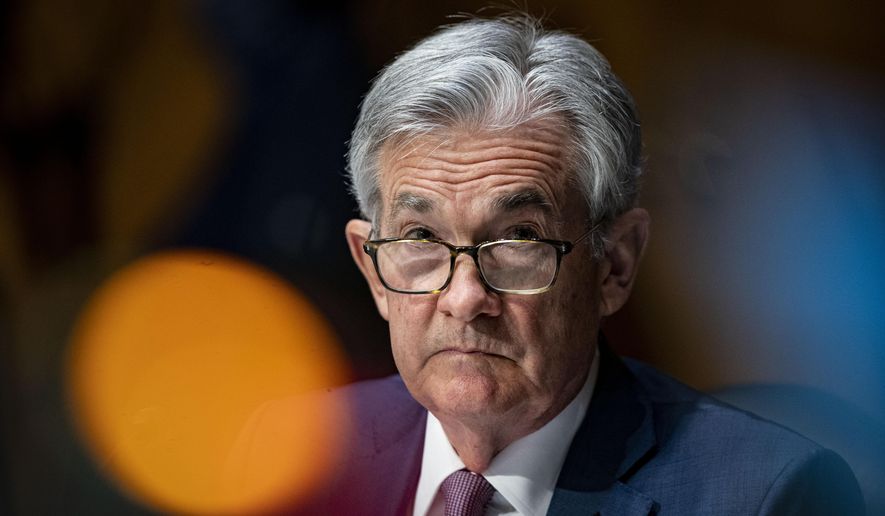OPINION:
President Biden’s budget deficits threaten to ignite the kind of inflation that followed the Vietnam War, and Fed Chairman Jerome Powell is happy to enable it.
The president inherited most pieces for a robust economic recovery.
Thanks to $4 trillion in COVID-19 relief measures enacted through December, the gap between aggregate demand and potential GDP in February was $380 billion. Only missing were additional assistance for the unemployed that would also modestly boost demand and a green light to take off masks for Americans to rev up their mighty economic engine.
Mr. Biden capitalized on Operation Warp Speed by supporting local public health agencies in distributing vaccines but ignored warnings about overheating the economy. The American Rescue Plan sent state governments, small businesses and most anyone else that looked like a prospective Democratic voter $1.9 trillion in additional stimulus — five times the output gap.
Armed with a buildup in savings from gorging on Netflix and banking stimulus checks, Americans are now spending more than global factories can provide, bottlenecks abound on everything from copper to computer chips and potato chips — and prices are jumping.
Mr. Powell keeps telling us inflation expectations in financial markets are not rocketing but that only indicates he’s persuaded bond buyers, not consumers who are bidding up prices for homes and everyday items.
Suppose Mr. Biden stuck $100 vouchers — printed by Mr. Powell — for takeout food under the windshield wipers of every car parked at Rehoboth Beach, every week for the next several years. Do you suppose the price of hamburgers and pizza at the seaside resort would rocket?
That’s exactly what the president would do but on a much grander scale with his $6 trillion 2022 budget.
Mr. Powell, like an overindulgent parent, is enabling him by keeping interest rates at depression levels and printing money to purchase about $1.4 trillion in government and mortgage-backed securities this year.
Is it any wonder that prices for homes are jumping out of sight and beyond the reach of many first-time buyers and especially working-class Americans, minorities and single mothers?
Mr. Biden is proposing the biggest budget deficits since World War II even though the U.S. economy by this summer will have made up all the lost growth imposed by the COVID-19 recession.
We have had two significant bouts with inflation since World War II. The jolt caused by the Korean War proved temporary as budget restraint resumed with the end of the conflict. The Great Inflation ignited by the combination of the Vietnam War and Great Society spending during the Johnson administration and accelerated by the oil crises of the 1970s.
During those years, Fed Chairmen Arthur Burns and William Miller made policy that was grounded in overestimates of potential GDP and employment and the output gap. And skepticism about the potency of monetary policy to curb inflation.
Gradually inflation rose with some ups and downs and ratcheted to double digits from 1979 to 1981.
Even with millions of workers still displaced by COVID-19, the economy is again bumping up against capacity limits and skilled labor shortages. Meanwhile, changes in what Americans buy, how they shop and hybrid work patterns have made many jobs in service activities and much commercial real estate in big cities obsolete.
Now Mr. Biden is proposing a federal budget with deficits exceeding $1.3 trillion a year indefinitely. A responsible budget would instead more narrowly focus on shoring up infrastructure, boosting technology industries that indirectly create demand for frontline service workers and assisting displaced workers to quickly retrain.
To meet the shortage of workers with digital skills, Levi Strauss is retraining retail employees with an intensive two-month program in statistics, coding, neural networks and other machine-learning techniques.
Mr. Biden needs to leverage such private sector efforts with support and relocation assistance for low-income workers displaced by the pandemic. However, such approaches are not fashionable with a woke Administration that wants to reorder American society with a $6 trillion federal budget that significantly exaggerates the social justice and inequality crisis.
Mr. Powell should stop enabling reckless federal spending by ending rock bottom interest rates and phasing-out the monetization of new federal debt with purchases of Treasuries and mortgage-backed securities. But that would put Mr. Powell out of step with his masters at the Treasury and National Economic Council who likely hold the strings on whether Mr. Biden nominates him for a second term.
We need better economics at the Fed but most of all we need more backbone — not a lawyer arguing the president’s case for big deficits.
• Peter Morici, @pmorici1, is an economist and emeritus business professor at the University of Maryland, and a national columnist.




Please read our comment policy before commenting.